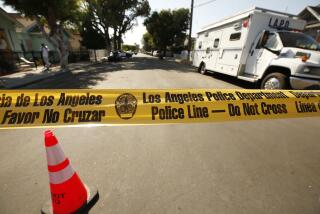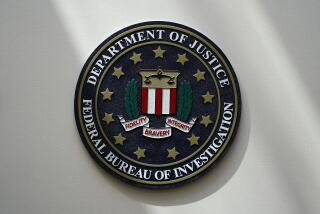Ex-Bin Laden Aide Says He Warned U.S. of Embassy Plot
- Share via
NEW YORK — A founding member of Islamic extremist Osama bin Laden’s terrorist organization testified Wednesday that he warned American authorities in 1996 that the organization was plotting to attack a U.S. embassy--two years before bombs decimated two embassies in East Africa, killing 224 people.
“I have information about people. They want to do something against your government,” Jamal Ahmed Al-Fadl, a former Bin Laden aide, said he told an embassy official when he sought asylum. He later also alerted FBI agents during extensive debriefings.
Speaking from the witness stand during the trial of four followers of Bin Laden charged in the attacks on the U.S. embassies in Kenya and Tanzania in 1998, Al-Fadl said he cautioned that Bin Laden’s followers would “try to make war against your country and they train very hard.”
Al-Fadl said he told a female employee of the embassy he visited that terrorists might “try to do something inside [the] United States and they try to fight the United States Army outside, and also they try to make [a] bomb against some embassy outside.”
Al-Fadl did not identify the employee or the location of the embassy where he sought refuge.
Al-Fadl said he convinced a clerk taking visa applications that he had “some information for your government.”
He said the visa clerk told him to sit in a chair, and 20 minutes later he was ushered inside the embassy by a woman.
The witness said he told her he had served in Afghanistan and had worked with Bin Laden’s organization al-Qaeda (the Base) for nine years. By the end of the week, three U.S. government officials were questioning him. That interrogation lasted three weeks.
Al-Fadl said he later was placed in FBI custody 24 hours a day for more than 18 months. He remains in the federal witness protection program.
Asked about the warning about an embassy attack, a State Department spokesman in Washington declined to comment, citing the ongoing trial in New York. FBI officials were not available.
In his day and a half as a witness, Al-Fadl has provided the jury with the most detailed portrait so far, outside of intelligence agency files, of Bin Laden’s organization. He has named more than a dozen front companies and scores of operatives, and probed Bin Laden’s psyche.
Al-Fadl said he tried to buy uranium for al-Qaeda, Bin Laden’s organization, in late 1993 or 1994. He said the uranium was offered for sale in Khartoum, the capital of Sudan, where Bin Laden had his headquarters.
The price was $1.5 million. After discussions with black market middlemen, he was shown a bag containing a 2- to 3-foot-tall cylinder. He said he was handed a document claiming the uranium--a component of atomic weapons--was from South Africa.
Al-Fadl said he didn’t purchase it. He told the sellers a machine would soon arrive from Kenya that would measure uranium’s quality and authenticity.
He said he didn’t know whether al-Qaeda eventually bought the uranium, but he was paid $10,000 by the group for doing a “good job.”
Al-Fadl said he decided to leave Bin Laden’s organization after he was caught siphoning $110,000 owed the group in commissions while he traded oil and sugar for al-Qaeda. He said he used the money to buy land and a car.
Eventually, after other members of al-Qaeda discovered the theft, Al-Fadl said he faced Bin Laden in an office in Khartoum.
“He told me, ‘I don’t care about the money, but I care about you because you start this from the beginning,’ ” the witness said the Saudi millionaire told him, referring to Al-Fadl’s role as one of the founders of al-Qaeda.
“We give you salary, we give you everything, when you travel we give you extra money. We pay your medical bill,” Al-Fadl said Bin Laden remarked before asking why he took the money.
He said after Bin Laden praised him as “one of the best people in the al-Qaeda group,” the leader demanded that the entire $110,000 be repaid before he would be forgiven.
“If you need money, you should come to us,” Al-Fadl quoted Bin Laden as saying. “. . . You didn’t do that, you just stole the money.”
Al-Fadl told the jury he had already repaid $25,000 to $30,000, but Bin Laden wasn’t satisfied and demanded the entire amount even though he was told no more money was available.
After the meeting, Al-Fadl fled Sudan.
Al-Fadl told the jury he had pleaded guilty in a U.S court, which was not named, to charges of terrorist conspiracy and transporting weapons. The plea was sealed because of national security considerations.
The witness said he could receive up to 15 years in prison or perhaps no prison sentence depending on the value of his cooperation.
He said the State Department in Washington had turned down his request for a reward for providing information about terrorism, but as part of his plea agreement, the government lent him $20,000 to start his life in America.
Two of the defendants in the embassy bombing trial--Khalfan Khamis Mohamed, 27, and Mohamed Rashed Daoud al-’Owhali, 23--could receive the death penalty. Mohamed Sadeek Odeh, 35, and Wadih El-Hage, 40, could face life in prison without parole if convicted.
All are charged with conspiring to kill U.S. citizens. More than 4,500 people were injured--many seriously--in the explosions. The dead included 12 Americans.
More to Read
Sign up for Essential California
The most important California stories and recommendations in your inbox every morning.
You may occasionally receive promotional content from the Los Angeles Times.













